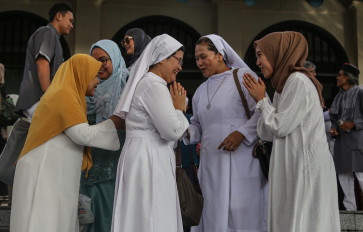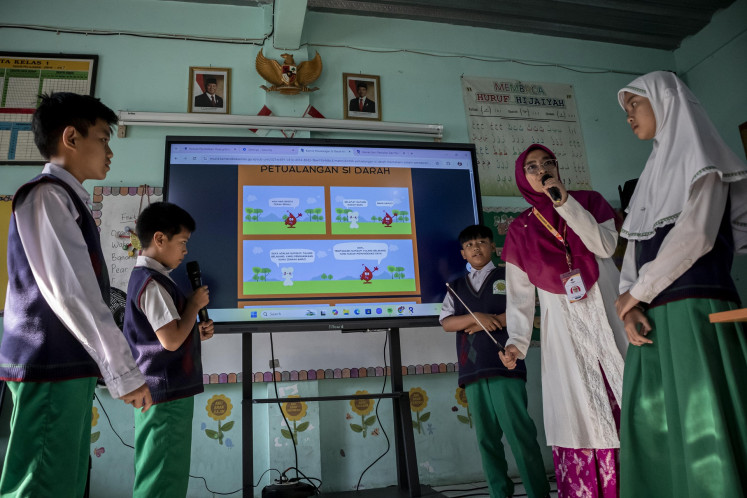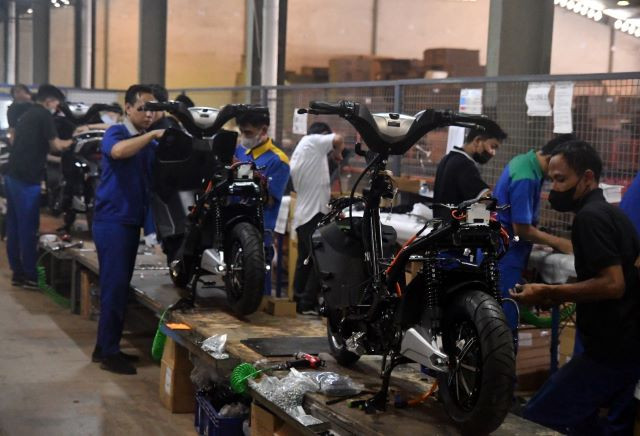Different queues, same buses for TransJakarta passengers
In a bid to clamp down on incidents of sexual harassment on its buses, the TransJakarta management on Thursday launched separate lines for male and female passengers, but critics call the system ineffective
Change text size
Gift Premium Articles
to Anyone

I
n a bid to clamp down on incidents of sexual harassment on its buses, the TransJakarta management on Thursday launched separate lines for male and female passengers, but critics call the system ineffective.
TransJakarta control manager Gunardjo said his company had posted signs directing passengers to queue in different lines according to gender at 140 busway shelters across the city.
“We also suggest passengers with physical disabilities, elderly passengers and children join the female passenger line,” he said, adding that the company had also briefed its field officers to inform passengers of the new system.
Gunardjo, however, said it was still difficult for the company to apply similar segregation on the bus as he predicted that it would take some time before all busway passengers got used to the new queuing system.
Last week, a female TransJakarta passenger reported a man to the South Jakarta Police for alleged sexual harassment. The woman said the man had groped her when the two were in a TransJakarta bus plying the Blok M-Kota route.
The police, however, dropped the case, citing a lack of witnesses.
On Thursday, The Jakarta Post observed that most passengers were not aware of the new signs.
In one of the busiest shelters, Dukuh Atas in Central Jakarta, for example, male and female passengers lined up together although several signs were visibly placed at the entrances.
Hisar, a duty officer at the shelter, said he had found it difficult to ask passengers to queue in different lines.
“No one listened to me all morning,” said the officer, who wielded a megaphone.
Lelita, a passenger, called the new ruling ineffective as passengers would mingle again in the buses.
“If the TransJakarta management was really serious about helping [women] avoid gropers, why don’t they provide a special bus just for women?” said Lelita, who takes the bus everyday from her house in Klender, East Jakarta, to her office in the Sudirman business district, Central Jakarta.
Earlier this week, Jakarta Police suggested the management install CCTV cameras aboard the buses and in the shelters, but the company played down the suggestion, saying the effort was not worth it, while insisting that its existing surveillance procedure was sufficient to protect passengers from sexual harassment and other petty crimes.
University of Indonesia criminologist Purnianti hailed the management’s willingness to address the sexual harassment issue.
However, she advised the management to involve police and organizations championing women’s rights to join the cause.
“Female passengers should not only rely on protection from the public transportation operator. They should be aware of the issue and know how to defend themselves when facing sexual harassment,” he said.
The TransJakarta service kicked off on Jan. 15, 2004, with 54 buses serving the 12.9-kilometer Blok M-Kota corridor. The city now employs 1,400 field officers and operates eight corridors, with corridors 9 and 10 still in the bidding process.
In 2009, it served 83.2 million passengers, more than five times the number of passengers it served five years earlier.









